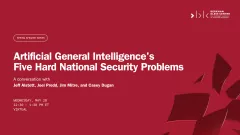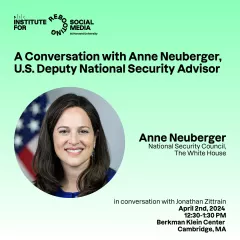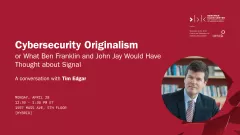
Artificial General Intelligence's Five Hard National Security Problems
The potential emergence of artificial general intelligence (AGI) is plausible and should be taken seriously by the U.S. national security community. Yet the pace and potential progress of AGI's emergence — as well as the composition of a post-AGI future — is shrouded in a cloud of uncertainty. This poses a challenge for strategists and policymakers trying to discern what potential threats and opportunities might emerge on the path to AGI and once AGI is achieved.
BKC is pleased to welcome Jeff Alstott, Joel Predd, Jim Mitre, and Casey Dugan from RAND, a nonprofit, nonpartisan research organization that provides leaders with the information they need to make evidence-based decisions.
Speakers
Jeff Alstott
Jeff Alstott is founding director of RAND's center for Technology and Security Policy (TASP), which performs policy R&D on technology competition and risks. Jeff is also also a senior information scientist and professor of policy analysis at RAND, and an expert at the National Science Foundation, where he runs a program on technology forecasting and improving R&D investment returns. His government service includes time at the White House as Director for Technology and National Security at the National Security Council and Assistant Director for Technology Competition and Risks at the Office of Science and Technology Policy. He previously worked in the Intelligence Community as a program manager at IARPA, with an R&D portfolio that included artificial intelligence, analytic methods, biosecurity, and science and technology forecasting; he helped lead intelligence working groups on AI intelligence collection and analysis, and was part of an award-winning team on technology counterintelligence. He has worked in academia for the Massachusetts Institute of Technology, Singapore University of Technology and Design, the World Bank, and the University of Chicago. Alstott's published research covers animal behavior, computational neuroscience, complex networks, design science, statistical methods, and science and technology forecasting. He obtained his doctorate studying complex networks at the University of Cambridge, and his MBA and bachelor's degrees from Indiana University.
Joel Predd
Joel B. Predd is a senior engineer at RAND where he served in various roles since 2006. Predd’s current research portfolio focuses on the geopolitics of artificial intelligence and on the intersection of the security and economic competition with China. Previously, Predd served as director of the Acquisition and Technology Policy Center (ATP) within the RAND National Security Research Division from 2018 until early 2022, where he oversaw a period of growth in the breadth and depth of RAND's portfolio of force planning, technology and acquisition, and supply chain research for Office of the Secretary of Defense (OSD), the Joint Staff, the Combatant Commands, defense agencies like DARPA, and international sponsors.
Jim Mitre
Jim Mitre is the inaugural vice president and director of RAND Global and Emerging Risks, which delivers rigorous and objective public policy research on the most consequential challenges to civilization and global security. Mitre previously served as the director of the RAND International Security and Defense Policy Program.
Before joining RAND, Mitre spent over a decade serving in multiple roles in the Department of Defense where he had responsibility for defense strategy, strategic analysis, scenario development, and force planning. He served as a senior advisor to the deputy secretary of defense for data and artificial intelligence, principal director and acting deputy assistant secretary of defense for strategy and force development, and as the executive director of the 2018 National Defense Strategy. Mitre was a presidential management fellow in the Office of the Secretary of Defense and served in Kabul, Afghanistan, and Nairobi, Kenya.
Casey Dugan
Casey Dugan is the associate director of analysis for the Technology and Security Policy (TASP) Center and a senior engineer at RAND. Prior to RAND, she managed the AI experience team at IBM Research, with the mission of doing research at the intersection of human-computer interaction (HCI) and AI, and co-led the human-centered AI research strategy there. Dugan has a background as a HCI researcher who has studied emerging technologies, from social media to AI, for nearly two decades. Her research has spanned workplace technologies/the future of work, social media/social networking, data analytics and visualization dashboards, recommender systems, games/gamification, and human computation/crowdsourcing. She is an author of 67+ scientific publications at conferences including CHI, IUI, CSCW, RecSys, AAAI, and NeurIPS, and a prolific inventor, with 34+ patents filed with the USPTO. She earned her S.B. and M.Eng. degrees in computer science from MIT.
More Information
Interview with Mitre
Artificial General Intelligence's Five Hard National Security Problems
Mitre Testimony in Brief
Alstott Testimony in Brief






